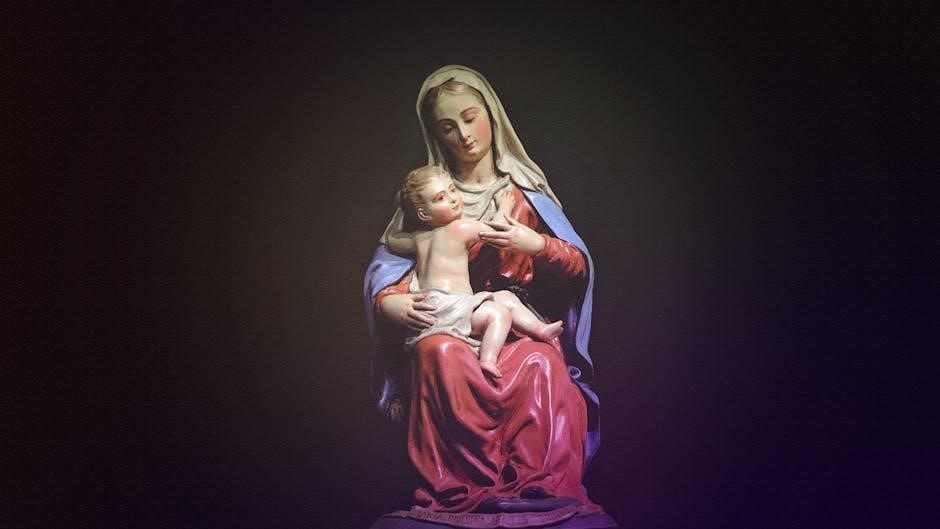Overview of “When God Created Mothers”
Erma Bombeck’s “When God Created Mothers” is a heartwarming poem that celebrates the essence of motherhood. The poem humorously yet touchingly captures the extraordinary qualities and tireless dedication of mothers. It emphasizes the vital role mothers play in nurturing their children.
The Author: Erma Bombeck
Erma Bombeck, the author of “When God Created Mothers,” was a renowned American humorist and writer. Born in 1927, Bombeck gained widespread recognition for her newspaper columns and books that humorously depicted suburban home life. Her writing resonated with countless readers, particularly women, who identified with her witty observations on the challenges and joys of family life.
Bombeck’s unique blend of humor and heart made her a beloved voice in American literature. She addressed everyday situations with a lighthearted approach, making her work relatable and engaging. Her ability to find humor in the mundane aspects of motherhood and family life cemented her legacy as one of America’s most cherished humorists. Her column was so famous that it was clipped and tucked away for enjoyment, showing its success.

Origin and Publication of the Poem
“When God Created Mothers” first appeared in Erma Bombeck’s syndicated newspaper column in 1974. The poem’s immediate popularity was such that it rapidly spread across America. Readers clipped it from newspapers, cherished it in purses, and displayed it on refrigerators as a testament to its heartfelt message.
The poem quickly became a cultural phenomenon, widely circulated and quoted, especially around Mother’s Day. Its simple yet profound celebration of motherhood resonated deeply with readers. The poem’s origin as a newspaper column highlights Bombeck’s ability to connect with her audience through accessible and relatable content. Its widespread adoption underscores the universal appreciation for mothers and their indispensable role in family and society. The poem’s initial publication in a column shows the success of her writing.

The Poem’s Central Theme: Celebrating Motherhood
The central theme of “When God Created Mothers” is a heartfelt celebration of motherhood and the extraordinary qualities inherent in mothers. The poem explores the idea that mothers are uniquely designed, almost divinely engineered, to fulfill their crucial role in raising children. It emphasizes the unconditional love, unwavering support, and tireless dedication that mothers provide.
Bombeck’s poem highlights the multifaceted nature of motherhood, acknowledging the strength, patience, and wisdom that mothers embody. It suggests that these attributes are not merely learned but are intrinsic to the very essence of being a mother. The poem underscores the idea that mothers are a gift, playing a vital role in society by nurturing and shaping future generations with compassion and grace. The poem serves to honor them.

Key Attributes of Mothers Highlighted in the Poem
The poem highlights key attributes of mothers, including patience, wisdom, strength, and unconditional love. These are seen as essential qualities that enable mothers to effectively raise and nurture their children, shaping them into good human beings.
Patience
Erma Bombeck’s poem underscores patience as a cornerstone of motherhood, portraying mothers as figures of remarkable endurance and understanding. The poem suggests that a mother’s patience is not merely a virtue but a necessity, a divine attribute enabling her to navigate the daily challenges of raising children. This patience allows her to tolerate the seemingly endless demands, the repetitive questions, and the occasional chaos that come with parenthood, all while maintaining a sense of calm and composure.
The poem implies that mothers possess a unique capacity to handle situations that would test the limits of others, offering a gentle and supportive presence even in the face of frustration. Bombeck highlights that this patience is a gift, allowing mothers to guide their children with kindness and understanding, fostering a nurturing environment where they can grow and thrive. It is through this unwavering patience that mothers instill valuable lessons and create a lasting impact on their children’s lives, shaping them into compassionate and resilient individuals.
Wisdom
Bombeck’s poem “When God Created Mothers” elevates wisdom as an indispensable trait of motherhood, depicting mothers as reservoirs of practical knowledge and insightful guidance. The poem suggests that a mother’s wisdom is not simply academic, but rather a deep understanding of life, human nature, and the unique needs of her children. This wisdom enables her to offer valuable advice, make sound judgments, and navigate the complexities of raising a family.
The poem portrays mothers as intuitive figures who can discern the best course of action in various situations, providing their children with the support and direction they need to succeed. This wisdom extends beyond mere problem-solving, encompassing the ability to impart essential life lessons, moral values, and a sense of self-worth. Bombeck implies that a mother’s wisdom is a gift, allowing her to shape her children into well-rounded individuals, equipped to face the challenges of the world with confidence and integrity. It is through this profound wisdom that mothers leave an enduring legacy, guiding their children towards a fulfilling and meaningful life;
Strength
Erma Bombeck’s poem “When God Created Mothers” highlights strength as a cornerstone of motherhood, portraying mothers as paragons of resilience and fortitude. The poem acknowledges the multifaceted nature of a mother’s strength, encompassing physical endurance, emotional resilience, and unwavering determination. Mothers are depicted as capable of withstanding immense pressure, overcoming obstacles, and consistently providing support to their families, even in the face of adversity.
Bombeck suggests that a mother’s strength stems from an innate ability to prioritize the well-being of her children, sacrificing her own needs and desires to ensure their happiness and success. This selflessness, combined with an unwavering spirit, enables mothers to persevere through challenging circumstances, serving as a source of inspiration and stability for their families. The poem celebrates the quiet strength of mothers who navigate the daily demands of childcare, household management, and emotional support, while simultaneously embodying resilience and grace. Through this celebration of strength, Bombeck underscores the profound impact mothers have on their children’s lives, shaping them into individuals who are capable of facing their own challenges with courage and determination.
Unconditional Love
Erma Bombeck’s “When God Created Mothers” profoundly emphasizes unconditional love as a defining characteristic of motherhood. This love transcends imperfections, mistakes, and challenging circumstances, offering unwavering support and acceptance. The poem suggests that a mother’s love is a constant, reliable presence, providing a safe haven for her children to grow and develop. This love is portrayed as a divine attribute, mirroring God’s own boundless affection.
The poem underscores that unconditional love fosters resilience, self-esteem, and a sense of belonging in children. Mothers are depicted as always ready to offer forgiveness, understanding, and encouragement, regardless of their children’s actions. This unwavering love empowers children to take risks, explore their potential, and navigate life’s challenges with confidence. Bombeck celebrates the transformative power of a mother’s unconditional love, highlighting its ability to heal wounds, mend broken hearts, and inspire personal growth. Ultimately, the poem affirms that a mother’s unconditional love is a precious gift, shaping her children into compassionate, empathetic, and loving individuals. It is the foundation upon which strong families and thriving communities are built.
Popularity and Impact of the Poem
Erma Bombeck’s “When God Created Mothers” achieved immense popularity and profound impact, resonating deeply with readers across generations. Its heartfelt portrayal of motherhood struck a chord, leading to widespread sharing and celebration. The poem’s simple yet powerful language captured the essence of a mother’s love, patience, and unwavering dedication, making it a beloved tribute to mothers everywhere. Its themes are universal.
The poem’s popularity stemmed from its ability to evoke genuine emotions and reflect the shared experiences of mothers and children. Its message of gratitude and appreciation inspired countless individuals to express their love and admiration for their own mothers. The poem has been widely circulated in print, online, and recited at Mother’s Day celebrations, solidifying its place as a timeless ode to motherhood. Moreover, “When God Created Mothers” has served as a source of comfort and inspiration during times of grief, offering solace to those who have lost their mothers. Its enduring appeal lies in its ability to remind us of the profound impact mothers have on our lives and the world.
The Poem’s Structure and Style
“When God Created Mothers” employs a narrative structure, presenting a scenario where God is in the process of creating mothers. This framework allows Bombeck to highlight the unique and multifaceted nature of motherhood. The poem unfolds through a conversation between God and an angel, adding a touch of humor and lightness to the profound subject matter. The angel’s questions and God’s responses reveal the intricate design and extraordinary qualities of mothers.
Bombeck’s writing style is characterized by its simplicity, warmth, and wit. She uses everyday language and relatable imagery to convey the poem’s message, making it accessible to a wide audience. The poem’s tone is both affectionate and humorous, celebrating the joys and challenges of motherhood with a touch of lightheartedness. The use of repetition, such as the phrase “When the Good Lord was creating mothers,” reinforces the poem’s central theme and creates a memorable rhythm. The poem’s structure and style contribute to its emotional impact and enduring appeal, making it a timeless tribute to mothers.

Interpretations and Analysis of the Poem
“When God Created Mothers” lends itself to various interpretations, all revolving around the central theme of celebrating motherhood. One interpretation views the poem as an acknowledgement of the divine qualities inherent in mothers. Bombeck suggests that mothers possess god-like attributes, such as boundless love, unwavering patience, and inexhaustible strength. These qualities enable them to nurture and guide their children, shaping them into compassionate and responsible individuals.
Another interpretation focuses on the poem’s social commentary. Bombeck highlights the often-overlooked contributions of mothers, emphasizing the demanding and multifaceted nature of their role. The poem serves as a reminder to appreciate and value the sacrifices mothers make for their families.
Furthermore, the poem can be seen as a reflection on the unrealistic expectations placed upon mothers. Bombeck acknowledges the challenges and imperfections of motherhood, suggesting that mothers are not superhuman but rather ordinary individuals striving to do their best. The poem’s humor and warmth offer solace and encouragement to mothers, reminding them that their efforts are appreciated and that they are not alone in their struggles.
